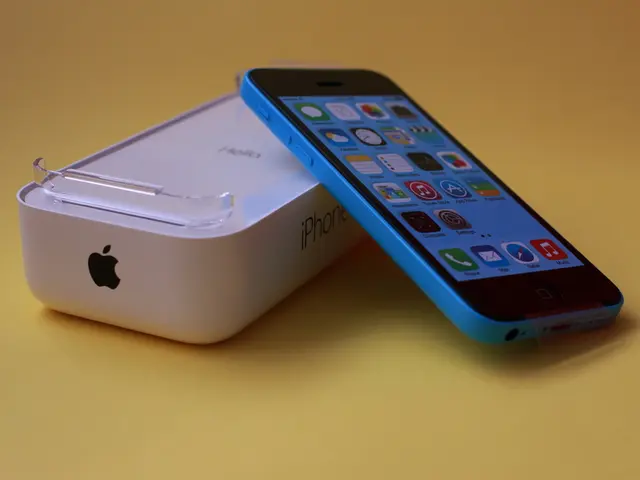iPhone Users Brace for Upcoming App Updates: Potential Drawbacks Unveiled
Heads Up: The Encryption Game Shift - iMessage Goes Android, but Is it a Win for Privacy?
It seems like the deadline for privacy advocates to rejoice and cybercriminals to sweat has finally arrived, as Apple confirms that iOS 19, expected this fall, will bring along one of iPhone's most anticipated security upgrades - extending iMessage encryption. But sniff a whiff of caution, 'cause things might not be as peachy as they seem.
Apple, along with Google, is set to adopt the updated Rich Communication Services (RCS) protocol from the Mobile Standards Setter (GSMA). The update brings a bundle of enhancements to messaging, but the standout feature? Cross-platform end-to-end encryption for RCS.
Just a few weeks ago, when the FBI and U.S. cyber defense agency advised users to put a halt on texting after Chinese hackers were caught reveling in U.S. networks, their advice was crystal clear – stick to fully encrypted messaging. Now, ironically, we're discussing encryption for different reasons.
The U.K., currently in secretive talks with U.S. officials, is reportedly seeking Apple to build a backdoor into everyone's data – just like those it's contesting in court. Meanwhile, France and Sweden are pushing for legislation to access secure messaging, and there are rumblings around the EU following suit. So, while the focus is mainly on messaging, it's important to recognize that it extends to the core iPhone proposition.
Before you jump on the excuse bandwagon and blame this on foreign shores, the FBI has shown interest in the same "lawful access." The proposed "STOP CSAM" bill, as per the Electronic Frontier Foundation's (EFF) warning, threatens to endanger encrypted messages.
So, although upgrading iPhones to securely message with Androids is a game-changer – marking the first time we've had fully secure stock messaging between platforms – it's not the unmitigated privacy victory it appears to be. The encryption battleground has transformed into an "emergency for us all," EFF warns. As privacy advocate Naomi Brockwell notes, "we need privacy, not because our actions are questionable, but because your intentions are."
Let's focus on the brighter side, though. The RCS 3.0 update not only secures content but also adds a range of new features, making it as user-friendly as iMessage. In the U.S., where iMessage and texting continue to hold out against apps like WhatsApp, this transformation is particularly significant. It shows that privacy isn't something that Apple is willing to compromise, even in the face of regulatory pressure – a fact evidenced by the U.K.'s controversial demand for backdoor access.
However, the landscape has taken a dramatic turn, and it remains to be seen whether Apple can deliver on its promises amidst the escalating calls for backdoor access. Despite these dark clouds, the introduction of E2EE for RCS messaging is certainly a step in the right direction, even if it's not the final battle won yet.
Enrichment Insights:
- RCS and MLS Protocol: The GSM Association has updated the Rich Communication Services (RCS) standards to include end-to-end encryption (E2EE) based on the Messaging Layer Security (MLS) protocol. This new standard will enable secure messaging between iPhone and Android devices.
- Apple and Google Commitment: Both Apple and Google are committed to implementing this new standard. Apple plans to add support for E2EE RCS messages in future updates across iOS, iPadOS, macOS, and watchOS, while Google is working to extend this protection to cross-platform RCS messaging.
- Government Demands for Backdoor Access: The recent deactivation of Advanced Data Protection (ADP) by Apple for U.K. users due to reported demands for backdoor access from the British government reflects concerns about potential government demands for backdoor access, which might impact the implementation of robust encryption standards.
- U.S., France, Sweden, and the European Union: While there are ongoing debates and discussions about encryption and backdoor access in these regions, there are no recent major developments similar to the U.K. situation. However, governments often express concerns about the balance between privacy and law enforcement needs.
Apple's confirmation of the iOS 19 update, set to bring iMessage encryption, signals a shift towards securing iPhone messaging, but challenges in maintaining privacy arise as Apple adopts a new Rich Communication Services (RCS) protocol that is under scrutiny due to possible government demands for backdoor access.
Although the RCS 3.0 update offers enhanced features, it also poses concerns regarding Apple's commitment to privacy, particularly in light of the UK's reported demand for a backdoor into user data and the potential threats posed by the proposed "STOP CSAM" bill.
As the encrypted messaging landscape continues to evolve, it remains crucial to strike a balance between privacy enhancement and government regulatory pressures, ensuring that user data remains secure while retaining the intended functionality of RCS messaging.







